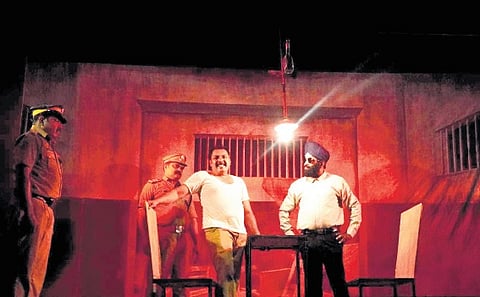

KOCHI: It all began in the mid-1980s, when a major controversy shook the theatre industry following the staging of ‘Christuvinte Araam Thirumurivu’ by playwright P M Antony. The Christian community opposed the play claiming it hurt their religious sentiments. As the issue escalated, a meeting was called by the chairman of the Kerala Catholic Bishops’
Council (KCBC) Media Commission at the Pastoral Orientation Centre’s (POC) Bible Room to discuss how to address the community’s dissent.
During the meeting, participants began offering suggestions. A priest quietly taking notes was asked by Mar Sebastian Mankkuzhikkari, then chairman of the KCBC Media Commission, to share his opinion. The priest was Fr Jose Plachikkal, who would later play a key role in launching the KCBC Professional Drama Festival at the POC in Palarivattom in Kochi.
In a souvenir released at this year’s ongoing drama fest, Fr Plachikkal writes about how the KCBC Media Commission initiated efforts to support theatre as a means of propagating Christian values. He recounts, “When asked by the chairman of the media commission, I pointed out that the incident (the uproar caused by P M Antony’s play) demonstrated the power of theatre. I asked why the Church couldn’t use this medium to present its magnetic charisma?”
Everyone agreed, and that was the beginning. “Things began moving quickly,” says Fr Cibu Irimbinikal, secretary of the KCBC Media Commission.
“Theatre troupes and playwrights were contacted. After the primary arrangements were completed, it was decided to stage the first theatre competition festival in 1987. We invited scripts from well-known professional theatre groups. These were then sent to leading theatre critics for evaluation. The plays selected by the panel of critics were given the green signal to participate in the festival.”
“The very first plays staged in the inaugural edition of the festival were biblical, alongside others that addressed social issues. These were presented in separate categories.”
However, in subsequent years, the number of biblical plays enter the festival began to decline. The reason, Fr Irimbinikal explains, was the large number of characters required, which increased production costs. There were years when only plays based on social issues were submitted.
In the early days, the festival was known as the ‘All Kerala Professional Drama Competition’. “However, since it was held as a competition and the public also viewed it as such, only the plays winning first prize received visibility. This happened even though other plays narrowly missed out on the prizes. Hence, it was decided to convert the competition into a festival. The plays participating in the festival were evaluated and given grades. This helped more dramas gain exposure,” Fr Plachikkal notes.
The drama festival is now in its 35th year, says Fr Irimbinikal. He recalls, “In 1987, five biblical dramas were staged. These included ‘Ancham Thiru Murivu’ by Alleppey Theatres, ‘Arthaban’ by Cochin Nadaka Vedi, ‘Vishuda Anki’ by Pala San Pious, and ‘Kanayile Kalyanam’ by Cochin Theatres.” In the festival’s inaugural edition, ‘Kanayile Kalyanam’, written by A K Puthussery, won the first prize.
“The festival has become one of the premier theatre festivals in the state,” Fr Irimbinikal remarks. “Dramas have always played a crucial role in Kerala’s socio-political and cultural milieu. There has been a great need to recognise and reward the artists, playwrights, and troupes who have been the torchbearers of social renaissance.”
He notes the growing public interest in the festival. “The demand has grown to such an extent that we had to introduce a system of selling season tickets online.”
Fr Irimbinikal dismisses claims that theatre is dying in Kerala, stating, “The festival itself proves how wrong that claim is! There are many well-known theatre artists, producers, and directors. Even today, some playwrights are still writing compelling scripts that captivate audiences,” he says.
He highlights the dedication of those who work both behind and in front of the curtain, driven solely by passion. “They are not interested in monetary gain. The thrill of presenting characters in their raw form, without any technological props, is what they live for. All this can be enjoyed at the drama festival,” he says.
Fr Irimbinikal adds that art refines human beings, which is why KCBC considers it a spiritual endeavour. “Art is a medium that can be used to inculcate moral values. This is why KCBC decided to associate itself with theatre.”
He also points out that some Syro-Malabar dioceses, such as Kanjirapally, Pala, and Kollam, have their own theatre troupes. “There are even priests who have penned some excellent scripts for these troupes,” he smiles.